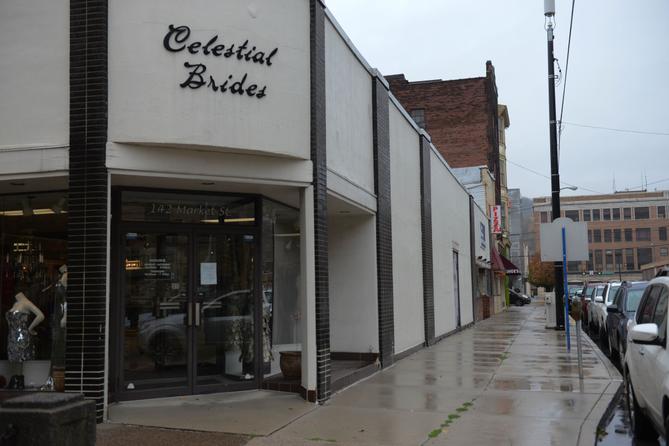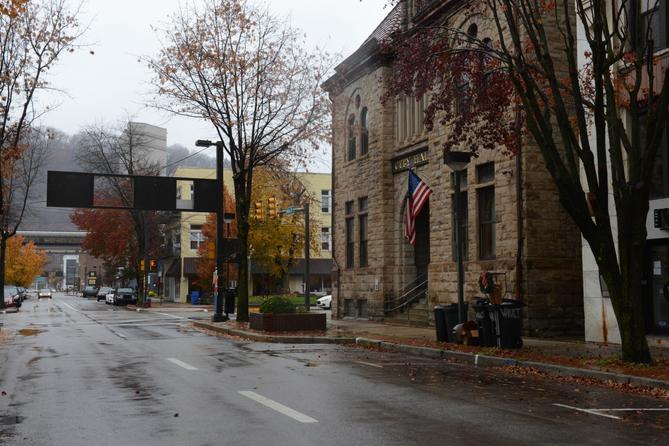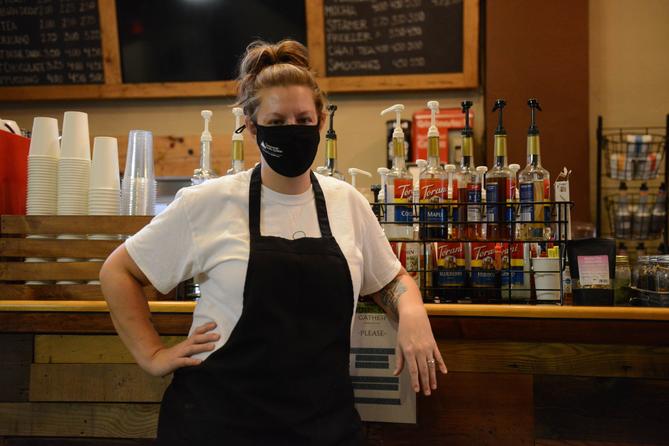Spotlight PA is an independent, non-partisan newsroom powered by The Philadelphia Inquirer in partnership with PennLive/The Patriot-News, TribLIVE/Pittsburgh Tribune-Review, and WITF Public Media. Sign up for our free newsletters.
HARRISBURG — A significant number of Pennsylvania municipalities are considering applying for a state program for the severely financially distressed, while those already in the program appear to be weathering the coronavirus pandemic better than expected.
In March, many city managers, mayors, and experts feared that 16 municipalities already enrolled in a state financial recovery program called Act 47 could suffer the most dramatically as the statewide economic shutdown undercut tax revenues.
But many have remained stable and are braced for fallout from the current surge, while others in better shape before the pandemic are faring worse.
A survey of 430 municipalities conducted this fall by the Pennsylvania Economy League, a civic leadership nonprofit, found that 23 townships, boroughs, and other local governments said they may now apply for Act 47 status as a result of their current financial pressure.
While that’s a small slice of the 2,560 municipalities in the state, it’s a significant number considering only 31 have enrolled and 15 have exited Act 47 since its inception in 1987.
The Act 47 program considers requests from municipalities that are struggling financially and decides whether they are qualified for a formal, state intervention with oversight that restructures debt, reins in costs, and bolsters tax bases. In some cases, technical assistance or grants are provided to tackle issues like insufficient housing and blight, or to invest in downtown areas.
About 40% of the surveyed municipalities said it’s too soon to tell just how bad the fallout from the pandemic will be, said LeeAnne Clayberger, CEO of the Pennsylvania Economy League.
“It just shows that there’s ongoing distress,” Clayberger said
It’s been nine months since the coronavirus pandemic first hit Pennsylvania and Gov. Tom Wolf ordered non-life-sustaining businesses to shutter. Local economies slowed, and 2.2 million people filed for unemployment. As a second wave hits, economies are still in jeopardy.
But not in the places you might expect.
The City of Johnstown — about 70 miles east of Pittsburgh, in Cambria County, with a population of about 20,000 — enrolled in Act 47 in 1992, in part to help boost its tax revenue amid the downturn of steel and manufacturing industries. It was already cutting extra spending, paying down debts, and had spent decades stabilizing its budget when the pandemic hit.
John Dubnansky, the city’s community and economic development director, said it has persevered without laying off any staff and by using federal coronavirus relief dollars to help local businesses.
“Our city, and other Act 47 cities as well, they’re resilient,” Dubnansky said. “They find a way to work through the hard times and work towards the future and making things positive again.”
Johnstown was on track to leave the Act 47 program in 2021, though the city opted to remain until 2023 to ensure a smooth transition.
The city received about $759,000 in federal coronavirus relief funds — available through the $2 trillion Coronavirus Aid, Relief, and Economic Security Act, or CARES Act, passed by Congress in March. Johnstown distributed that money as forgivable loans to about 30 local businesses.
“That’s basically kept us open,” said Sharon Honkus, owner of Celestial Brides, a bridal, prom, and special occasion dress shop in downtown Johnstown that’s been operating for 23 years.

Like other Pennsylvania business owners, Honkus said she worked hard to endure the mandatory closures earlier this year.
The delicately beaded dresses at her shop remained on the racks as senior prom season came and went. Weddings were postponed, and galas requiring formalwear were canceled as the pandemic dragged on. Honkus had hardly any sales over the summer.
“Without those types of events, people don’t really have a need for what we sell,” she said.
She was granted a $15,000 loan from Johnstown, which helped her pay her two full-time employees and purchase essential supplies such as masks, hand sanitizer, wipes, and an ultraviolet light used to disinfect gowns.
A few blocks away, Kristy Hagan, owner of Flood City Cafe, is approaching her two year anniversary of owning the business.
Hagan bought the downtown Johnstown restaurant in May 2019 and had to shut it down less than a year later, for nearly two months.
She used her $15,000 city loan to pay bills she missed during that period.
The Borough of Greenville, which has about 5,500 residents and sits near the Ohio border in Mercer County, enrolled in Act 47 in 2002. It also avoided financial catastrophe when the pandemic hit earlier this year.
Like Johnstown, Greenville’s 2020 budget was buoyed by property taxes that were collected from residents early in the year. The borough took some precautions, such as foregoing part-time staff to maintain parks over the summer. Revenue only declined by about $10,000, roughly 0.3% of the borough’s $2.7 million annual budget.
“Unless you just went into Act 47, you’ve already made yourself sustainable to weather these types of things,” Borough Manager Jasson Urey said. “We saw it when the industries and businesses left 20 years ago. That really sent us spiraling.”
Urey said he doesn’t anticipate big losses in 2021. But he and other municipal leaders are bracing, in case unemployment persists and residents find themselves choosing between paying bills and taxes, or buying groceries.
Feeling the pain
Other municipalities in relatively good financial health are feeling the pain.
The City of Greensburg’s $11.8 million budget for 2021 is about $200,000 smaller than it was in 2020.
Those cuts were made in order to avoid laying off city staff or raising taxes for residents, said city Councilman Randy Finfrock, who directs the city’s accounts and finances. While there are still streets to pave and public works vehicles to replace, Finfrock said those and other projects will just have to wait.
“I understand that we’re kicking cans down the road,” he said. “We’ll have to look at it again next year. This just wasn’t the year to be able to look for sources of revenue.”
The pandemic was a “revenue killer,” he said. High unemployment depressed the city’s earned income tax and has put next year’s property taxes in jeopardy.
Greensburg, the county seat of Westmoreland County, is also losing money in parking fees generated by county courthouse visitors and downtown traffic. Some businesses that serve downtown shoppers and office workers have closed.
Westmoreland County is distributing CARES Act money, and Greensburg has applied for $30,000 to cover the cost of personal protective equipment and other pandemic-related supplies, like hand sanitizer, for city employees, police officers, and firefighters.
Greensburg typically budgets to collect property taxes from 97% of city residents who owe them. In 2021, they’re aiming for at least 93%. If that number is lower, Finfrock said the city could run into budget challenges.
“We can take a year’s hit,” he said. “I don’t know that we can take two, but we can take one.”
The uncertainty is ubiquitous, said Brian Jensen, senior director of policy and advocacy at the Allegheny Conference on Community Development, a nonprofit that advocates for economic development across Southwestern Pennsylvania.
“I can’t emphasize enough: It ain’t over yet,” Jensen said. “We’ve still got some pain to go through.”
Huge tax increases
In addition to the 23 municipalities that disclosed that they may request Act 47 status, another 38 said that they are likely to apply to participate in another state program, the Strategic Management Planning Program, which also assists with financial planning, according to the Pennsylvania Economy League survey.
Respondents who said they are considering those state programs included small municipalities with budgets of less than $250,000 per year and larger communities with operating budgets around $2.5 million. They spanned urban, suburban, and rural areas throughout the state.
More than half of those surveyed also saw or expected a decline in earned income tax, which is deducted from workers’ paychecks. Amusement tax, along with fees collected from parking and the use of other community facilities, have also taken a hit as events are canceled and restaurants and bars rein in service.
In West Chester borough in Chester County, officials proposed a 2021 budget with a 32% property tax increase because of a more than $2 million shortfall. In Newtown Township in Bucks County, officials in October proposed a draft budget that included a 178% property tax increase for 2021.
Municipalities that manage their own sewage and water could face setbacks if people continue to skip or delay utility payments, said George Dougherty, a public policy professor at the University of Pittsburgh who works with financially distressed municipalities.
“Those kinds of things hurt really bad, because you’ve got to pay for the water,” he said. “The municipalities end up paying upfront.”
But Braddock, a municipality outside of Pittsburgh that’s home to about 1,700 residents, operates its own water authority, and, so far, residents have been keeping up with their bills, Mayor Chardae Jones said.
“I panicked at first,” Jones said, because the borough was nearing financial stability after enrolling in Act 47 in 1988.
But CARES Act money helped maintain Braddock’s budget by offsetting the costs of hand sanitizer, masks, and hiring extra employees to clean municipal buildings. Jones is confident that the borough will still be able to exit Act 47 as planned sometime next year.

Hagan, of Johnstown, said her restaurant is still struggling, even as it operates with limited indoor seating and takeout. Most of her customers typically come from downtown offices, but they’re still working remotely, she said. The ones still working in the city aren’t spending as much on dining out.
She’s hoping more federal aid becomes available for businesses like hers.
“People aren’t going back to work any time soon,” Hagan said. “Plus, people don’t have money right now.”
100% ESSENTIAL: Spotlight PA relies on funding from foundations and readers like you who are committed to accountability journalism that gets results. Give now and your contribution will be DOUBLED: spotlightpa.org/donate
